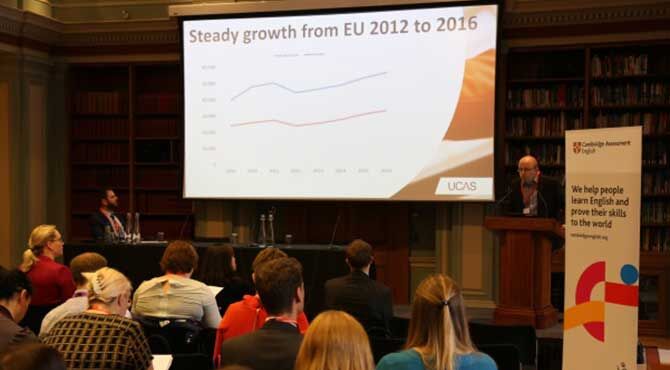Brexit: can UK universities sustain international admissions?
One year on from Brexit, professionals from UK universities and UCAS gathered in London to debate its impact on international recruitment at UK universities and to discuss future challenges.

Britain's educational institutions remain international in their outlook
International admissions and recruitment professionals from over 60 UK higher education institutions attended the event – including King’s College London, University of Cambridge and University of Oxford, as well as notable arts and sports institutions such as Royal Academy of Dance, University for the Creative Arts, Royal College of Music, and UCFB.Petra Olsson from Cambridge English, said, “The UK may be leaving the EU, but Britain’s educational and cultural institutions remain just as international in outlook as ever – by working together we can ensure a prosperous future for student mobility.“Cambridge English has worked with the European institutions for more than 40 years and, looking ahead, we will maintain our strong relationship with the Council of Europe, and will continue to build on our collaborations with the European Parliament and the European Commission.”
A decrease in EU applicants to UK universities
Mark Wilson, international market manager, UCAS, explained the implications of the referendum for undergraduate recruitment, “Pre-Brexit anxiety and uncertainty has had a disruptive impact on international admissions. Where we have previously seen strong year-on-year growth, during the 2017 cycle, there has been a decrease in EU applicants by 9 per cent in October 2016, 7 per cent in January 2017, 6 per cent in March 2017 and 5 per cent in June 2017, compared to the previous cycle.”“One of the biggest repercussions of the drawn-out process of Brexit negotiations for UK Universities may be the gradual withering away of the UK’s strong position and a loss of share to competitors. To sustain undergraduate recruitment from the EU, we now need to respond with innovative delivery and partnership models that will help mitigate some of the potential financial and visa issues.“A challenge will be to lobby for clear transitional arrangements and clear messaging for future students as soon as possible – knowing where things stand will be of value to prospective students. A collective, sector response is needed and UCAS is keen to play a role in supporting that.”UK university EU branch campuses: a popular choice
In a recent international student survey of 62,000 prospective international students by Hobsons, results suggested that greater investment in EU Transnational Education (TNE) could provide an answer to falling student numbers, with the majority of EU students surveyed saying that they would be likely to study at an EU branch campus of a UK university post-Brexit; however they would prefer not to study in their home country. The implications of Brexit on Erasmus+ were also discussed. Naquita Lewis, Erasmus+ programme lead for Higher Education, British Council, explained, “Erasmus+ gives young people the opportunity to go abroad for a different learning environment, and to have personal and social experiences that build confidence, communication and people skills which are proven to boost employability.“The skills that they develop are skills for life and are absolutely the skills that we need to make our economies perform better. They are not just personal skills.”“So far we have not seen a decrease in interest in Erasmus+ since the referendum, in fact we are awarding more funding for mobility grants within Europe in 2017 than ever before. Looking to next year, the UK Government has confirmed that the Treasury will underwrite grant agreements for Erasmus+ signed while the UK is still an EU Member State, even if payments continue beyond the point of the UK’s EU exit date.”Related news:
- UK universities ‘facing growing global challenge’
- University tuition fee freeze: how will it affect you?
- Oxford University: Staff planning to leave because of Brexit
Chris Lyons from UK NARIC, an organisation that compares international qualifications and skills, summarised, “It is easy for individuals and establishments in the education sector to focus on the negatives that Brexit has uncovered, however, with change always comes opportunity.“It is up to us to educate the communities around us, whether in the UK or globally, on the impact and opportunities we face – we may not have been prepared for the result of the referendum but we must now prepare others for its impact.”
Relocate Global's Guide to Education & Schools in the UK 2017 is packed with expert education advice for those who are relocating and the professionals supporting them. Access your digital copy here.
For related news and features, visit our Education & Schools section. Look out for the launch of 2018's Relocate Awards, entries open in January. Relocate’s new Global Mobility Toolkit provides free information, practical advice and support for HR, global mobility managers and global teams operating overseas.
 Access hundreds of global services and suppliers in our Online Directory
Access hundreds of global services and suppliers in our Online Directory
©2025 Re:locate magazine, published by Profile Locations, Spray Hill, Hastings Road, Lamberhurst, Kent TN3 8JB. All rights reserved. This publication (or any part thereof) may not be reproduced in any form without the prior written permission of Profile Locations. Profile Locations accepts no liability for the accuracy of the contents or any opinions expressed herein.







































